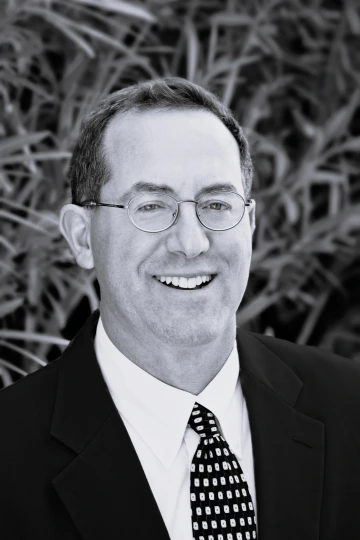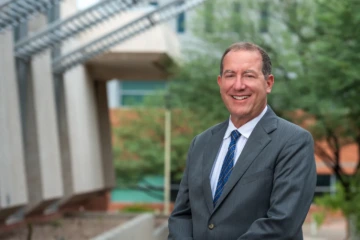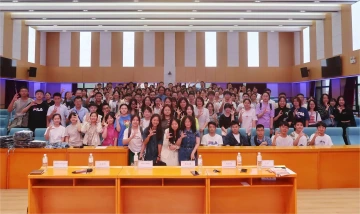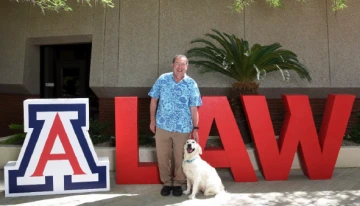
Marc Miller (2012).
Melissa Haun. Arizona Law Deans Portrait Collection. Digitized by: Daniel F. Cracchiolo Law Library, James E. Rogers College of Law, University of Arizona, Special Collections.
DEAN MARC L. MILLER: 2012-2025
Before Arizona Law
Marc L. (Louis) Miller was born in Chicago and raised in Los Angeles, California.[1] He went to the UCLA lab school for elementary school, and to public school at Paul Revere Junior High, and Pacific Palisades High School. While Miller was growing up his father, Howard, was a law professor at the University of Southern California, and Miller spent hours in law school hallways and classrooms, sometimes being confused for a law student, and at gatherings at home listening to lawyers debate the issues of that time. Miller’s mother, Shirley, a national debate champion in dramatic interpretation in college, ran a travel agency and tour company (Adventures in Anthropology).
Miller attended Pomona College.[2] While in college he pursued programs related to the history and politics of India. In 1979, he conducted research on urban housing in Lucknow, Uttar Pradesh, India, and worked on his proficiency in Hindi. He attended Oxford University in 1980 and focused on political philosophy and Indian history. He was a member of Phi Beta Kappa, an academic honor society. Miller completed his bachelor of arts with honors in politics, philosophy, and economics in 1981.[3]
After completing his undergraduate degree, Miller enrolled at the University of Chicago Law School—literal feet from where he was born and lived for the first year of life. He earned a place on the University of Chicago Law Review as the managing and book review editor. Miller was mentored by Chicago faculty including Edward Levi, Richard Epstein, Frank Zimring, and Norval Morris, with whom Miller wrote several articles while a student. Miller graduated with his juris doctor (JD) with honors in 1984.[4]
Following law school, Miller served as a law clerk for Chief Judge John C. Godbold of the United States Court of Appeals for the Eleventh Circuit in Montgomery, Alabama, from 1984-1985. He worked as an attorney-advisor in the Office of Legal Counsel for the U.S. Department of Justice in Washington, D.C. from 1985-1987. He then worked as special counsel at the Vera Institute of Justice in New York City from 1987-1988.[5]
In 1988, Miller began his teaching career as an assistant professor at Emory Law School in Atlanta, Georgia. He was promoted to associate professor in 1994 and full professor in 1998. From 2003-2006, Miller also served as the associate dean for faculty and scholarship at Emory Law School.[6] During this period, he was a visiting scholar at Stanford Law School in the 1995-1996 academic year, and a visiting professor at Duke Law School in spring 1998.
Miller is recognized as both a criminal justice and environmental scholar. He has published over 90 articles and essays on topics such as prosecutorial discretion, sentencing, police practices, public lands and natural resources (with a sustained focus on harmful invasive species), immigration, and legal theory.[7] He is an editor on three casesbooks published by Aspen Publishers: two in criminal procedure,[8] and one in sentencing.[9] The criminal procedure books are notable for their attention to state law, statutory law, and executive branch policies. The sentencing book was the first casebook to focus solely on the emerging law of sentencing and helped shape the field.
With Daniel Freed of Yale Law School, and with the support of the Vera Institute of Justice in New York, Miller co-founded the Federal Sentencing Reporter, the leading journal on sentencing law. For many years he was the 20th most cited criminal law and procedure scholar in the United States.
In 2005, Miller was a visiting professor at the University of Arizona James E. Rogers College of Law. He joined the faculty and was named the Ralph W. Bilby Professor of Law in 2006.[10] He served as vice dean at Arizona Law from 2011-2012.[11]
Tenure as Dean
Miller was named interim dean in November 2012, following the resignation of Dean Ponoroff, and he was officially appointed as dean of Arizona Law on July 1, 2013.[12] His leadership was marked by a profound commitment to expanding access to legal education and reshaping the legal profession.[13] In addition, Miller’s long tenure reflected a sustained response to the decrease in demand for JD degrees that occurred after the 2008-2010 recession, with a national decline in JD applications of forty percent over two years, and a decreased number of JD applications and smaller national JD pool ever since.

Marc Miller (c. 2024).
University of Arizona, James E. Rogers College of Law.
Under Miller's guidance, Arizona Law pioneered innovative programs within and beyond the traditional JD program. These programs both diversified the work and revenues of Arizona Law, and made legal education more accessible.[14] When Miller started his deanship the law school taught less than 500 current degree-seeking students, in the traditional JD and small LLM and SJD programs, all in-residence. When he stepped down from the deanship the law school taught more the 2,500 hundred current degree-seeking students, in the JD, AJD, LLM, SJD, BA in Law, MLS and MPS programs, and additional students in undergraduate, graduate and professional programs.
During Miller’s tenure, the College of Law made positive impacts and expanded legal education in Arizona, the US, and abroad. The law school not only changed who it taught, and what it taught, but also where it taught and how it taught, with the creation and significant increase in online courses and degrees, and the creation of microcampuses. The college built an in-house professional online development team, and built a professional recording studio.
Arizona Law added two new degree programs the Bachelor of Arts (BA) in Law and Master of Legal Studies (MLS). The BA in Law degree was launched in 2014, the first of its kind in the United States. The degree was designed and is delivered in partnership with the School of Government and Public Policy (SGGP), which is in the University of Arizona College of Social and Behavioral Sciences (SBS). Today, the BA in Law serves over 1,900 students across Tucson, online, and at microcampuses globally. Versions of the BA in Law have been copied by other US law schools and universities including the University of Southern California, SUNY Buffalo, and Wayne State.
The MLS program was designed for professionals seeking to understand law and regulations without needing a traditional JD. The MLS program currently serves over 400 students, predominantly online. Hundreds of graduates have entered diverse fields such as compliance, health law, and regulatory science.[15]

Orientation for University of Arizona BA in Law students at Ocean University in Qingdao, China (2023).
Marc L. Miller
Miller supported substantive collaborations with numerous University of Arizona colleges beyond SBS and the BA in Law – on coursework, degrees, dual degree programs, and research initiatives.[16] Arizona Law collaborated with the College of Information Science to create new dual and fast-tracked degree pathways to law librarianship.[17] Arizona Law collaborated with the College of Pharmacy and the College of Public Health to develop a series of professional masters level courses and certificates in health law for health professionals, aging law and policy, regulatory science, and health information, privacy, compliance, and data security.[18]
With the College of Agriculture, Life & Environmental Sciences, Arizona Law created a Natural Resources Users Law & Policy Center,[19] that has received significant support from Arizonans across the state and the Arizona state legislature, and an associated Natural Resource Use & Management Law Clinic.[20] Arizona Law’s global mining law and policy masters classes and mining law program[21] become a key component of the School of Mining with the Colleges of Engineering and Science.[22]
Partnerships with the Eller College of Management include a JD-MBA degree path and work in entrepreneurship. One newer initiative is an accelerated MLS for students obtaining a Bachelors of Applied Science in Cyber Operations.[23] A new and long discussed BS in Science Law with the College of Science is currently working its ways through college and university review. A key one-time partnership was illustrated by the development of new digital materials for the Department of Athletics when the NIL revolution arrived.[24]
The College of Law broke new ground in 2016 by being the first law school to accept the GRE for JD admissions, a practice which Harvard followed a year later, and an option now adopted by over half of all U.S. law schools.[25] The evidence-based effort to add the GRE resulted in a very public national battle with LSAC, the company that administers the LSAT, which threatened to expel the University of Arizona from LSAC.[26] Ultimately 153 deans signed a letter information LSAC – a member organization of law schools – that any hostile action towards Arizona Law would fail.[27]
As a next step, Miller joined Associate Dean and colleague Chris Robertson, and they hired Jess Findley and worked with Professor Robert Williams and others, to create the research-based JD-Next course and exam to reduce or eliminate racial disparities found in traditional admissions tests, and to increase success for first-generation students and those new to the legal system.[28] The developmental work on JD-Next was fully funded by grants from the AccessLex Foundation and the ETS Foundation. After proof of concept, and with the help of Tech Launch Arizona (TLA), JD-Next was licensed and then sold to Aspen Publishers.

Marc Miller and his golden retriever, Spirit, in front of the College of Law (2021).
University of Arizona, James E. Rogers College of Law.
Miller's impact extended beyond the university walls, influencing legal practice, especially in Arizona, which in recent years has ranked 49th out of 50 states in lawyers per capita.[29] For instance, the Arizona Supreme Court, at the suggestion of and in collaboration with Arizona Law, approved the February bar option, allowing third-year JD students to take the bar exam before graduation.[30]
Arizona Law worked to support new state programs, such as the Arizona Supreme Court’s Legal Paraprofessionals (LP) and Arizona Legal Apprentice Program (ALAP) to address the shortage of legal professionals in Arizona.
The new role of Legal Paraprofessional (LP) allows licensed undergraduates and graduates to practice law in fundamental, limited areas like administrative, civil, family, criminal, and juvenile law, addressing unmet legal needs.[31] The LP program is a model for potentially significant new approach to the profound and longstanding access-to-justice challenges, which extend far beyond Arizona.
ALAP provides a licensure pathway for individuals scoring 260-269 on the bar exam who commit to working in rural areas or for public entities.[32]
Arizona Law’s influence under Miller also reached international and Indigenous communities.
The advanced JD (AJD) admissions program supported the enrollment of talented lawyers from outside the U.S.[33] In some years as much as ten to twenty-five percent of the JD class was made up of international lawyers. By leading and effort to lower non-resident JD tuition, applications from non-residents increased to more than 80 percent of the US JD pool, and the majority of JD students coming to Arizona have for some time been from out of the state, or out of the country. (The majority of JD graduates stay in Arizona for their first job after law school).
The BA in Law has opened career paths and a deeper kind of law school preparation, for those who want it, for US students. But the BA in Law also opened up the possibility of international dual degree programs, since around the world law is primarily and overwhelmingly taught as an undergraduate degree. One year after starting the BA in Law in the United States, Arizona Law entered into a partnership with Ocean University of China (OUC), in the northern coastal city of Qingdao. (Or, as many Americans know it from the beer, and the older spelling – Tsingtao). There are 500 students in the program seeking an LLB in Chinese Law (from OUC) and the BA in Law (from the University of Arizona) – both of which they obtain in four years, the same time that most Chinese law students obtain the LLB alone.
The OUC program celebrated its 10th anniversary and 2025, has already produced 581 graduates.[34] It remains a unique partnership in US and global higher education, in providing two undergraduate degrees, in two different languages, for two different countries and systems.
In an unprecedented move, in 2022 Arizona Law became the first U.S. law school ever to be approved by the ABA to deliver an accredited U.S. JD entirely outside the U.S., through a collaboration with the University of Technology Sydney.[35]
Since 2018 Arizona Law has conducted a foreign diplomat training program, with hundreds of U.S.-based Mexican and other foreign diplomats and diplomatic staff receiving training through a special partnership with the Mexican foreign service. And for four years, Arizona Law, under the leadership of Professor and Associate Dean Teresa Miguel-Stearns, partnered with the Universidad Nacional Autónoma de México (UNAM) – the most important university in Mexico, and arguably in all of Latin America – and its Instituto de Investigaciones Jurídicas (Legal Research Institute) to deliver a diplomado (certificate) for students who completed four courses on Mexican constitutional law and policy, taught entirely in Spanish.
Miller also oversaw significant internal advancements for the JD students and facilities at Arizona Law. The legal writing program, long a strength, was professionalized and expanded under the leadership of Professor Susie Salmon, and the excellent existing clinical program was expanded to include the Intellectual Property Clinic, Natural Resource Use and Management Clinic, and the Education Law Clinic. Arizona Law has been highly ranked both for legal writing program and experiential opportunities.
Arizona Law’s JD program regularly accomplished high employment results with over 90% of graduates securing fulltime positions in 2023 and 2024.[36] Miller’s direction has resulted in unprecedented academic success, diversity, and employment.[37] The law school worked with the Arizona Supreme Court and others to develop the February bar option, which has now become a regular part of the licensure pathway. As at many law schools, bar pass rates overall have been an area needing tending, and with the support of the faculty Miller built a bar success team and program which is producing excellent results.
Arizona Law’s Indigenous Peoples Law & Policy Program (IPLP) continues to be a world leader, shaping legal bodies and training professionals in the field.[38] Miller has been a vocal supporter and champion of the IPLP program. In 2022, the Pascua Yaqui Nation microcampus was opened on the Pascua Yaqui Reservation near Tucson.[39] The campus provides affordable educational opportunities related to Indigenous economic growth, governance, and community sustainability.[40]
Miller focused on student support and welfare. That focus, and indeed the health and welfare of all members of the community, were severely tested during COVID. The history of the impact of COVID on education has not been written, and may never be. But in the moment, from Miller’s perspective the law school community worked together and communicated well under immense stress.
There were lighter moments as well. During his tenure alumnus Mark van Vleet, then serving as General Counsel of Fender, Inc., was the catalyst for a donation of music instruments that now make up the Fender Room – a space in a historic casita across from the law school where students can go to make music and blow off steam.
Miller capped his fundraising efforts with the “A New Day in Court" Project. This was a 100% donor-funded project featuring newly completed, state-of-the-art courtrooms and classrooms, and honoring the legacy of Professor Emeritus Tom Mauet.[41] The beautiful new Kevin R. Boyle and J. Michael Hennigan courtrooms – with their translucent glass walls – were commemorated in October 2024.[42]

Dean Marc Miller and Kevin R. Boyle ('97) celebrate the opening of the Kevin R. Boyle Courtroom and the J. Michael Hennigan Courtroom on Oct. 18, 2024.
University of Arizona, James E. Rogers College of Law
The College of Law’s endowment grew by more than $26 million during Miller’s tenure, with millions more pledged.[43] This funding allowed for the establishment of two new endowed professorships and 23 new endowed scholarships. Annual grant and research funding increased more than tenfold, bringing in $2-to-$5 million annually in recent years.[44]
During Miller’s long tenure, the College of Law’s faculty, programs, and clinics expanded. Over 45 new faculty members joined Arizona Law, enriching its scholarly and teaching environment. Along with the professionalization of the legal writing program and expansion of the clinical program, the college added the Innovation for Justice (i4J) program, TechLaw, QuantLaw and other initiatives fostering new approaches to legal thinking and legal service delivery.[45]
After a distinguished twelve-year tenure, Miller stepped down in January 2025. He ended his deanship as the third longest serving dean in the history of Arizona Law and as the 9th longest-serving current law dean (out of 198 schools) in the country.[46] Miller expressed immense pride and gratitude for the collective efforts of faculty, staff, students, alumni, and supporters. He highlighted the significant contributions of twelve cohorts of graduates who have gone on to represent clients in public and private settings, shape policies, lead firms, and serve as judges and justices.[47]
Next Steps
Miller looks forward to returning to the classroom and dedicating more time to scholarship in multiple fields and areas of interest, including work on pathways to legal study and access to law. He hopes to continue to strengthen Arizona Law’s global and online initiatives. He remains committed to the success of Arizona Law students and the greater Arizona Law community.[48]
Miller is married to Christina Cutshaw, Ph.D., who teaches at the University of Arizona College of Public Health.[49] Miller and Cutshaw have three children: Owen – who is pursuing the BA in Law at the University of Arizona, is interested in space law and policy, and who plans to become a lawyer, Evelyn (Evie), who is a college student at the University of Chicago studying linguistics and psychology, and Wyatt who is a senior at Catalina Foothills High School, committed to jazz drumming, AI and F1 racing.[50]
-- Tanya Furlong (’26)
[2] Univ. of Ariz., Marc Miller’s Curriculum Vitae (CV), February 2025, at 1.
[3] Id.
[4] Id.
[5] Id.
[6] Id.
[7] Univ. of Ariz., James E. Rogers College of Law, Marc L. Miller.
[8] Criminal Procedures—The Police: Cases, Statutes & Executive Materials (Aspen 7th Ed. 2023) (with Ronald Wright, Jenia Turner & Kay Levine); Criminal Procedures—Prosecution and Adjudication: Cases, Statutes & Executive Materials (Aspen 7th Ed. 2023) (with Ronald Wright, Jenia Turner & Kay Levine).
[9] Sentencing Law & Policy: Cases, Statutes & Executive Materials (Aspen 5th Ed. 2022) (with Nora Demleitner, Doug Berman & Ronald Wright).
[10] Id.
[11] Id.
[12] Id. Scouting Legal Innovation: UA Law School Dean Marc Miller, Arizona Attorney (April 2014).
[13] Exiting on a High Note, Arizona Attorney (Feb. 2025).
[14] Marc Miller, Univ. of Ariz., James E. Rogers College of Law, Letter of The Law, With Gratitude, Stepping Down as Dean, Nov. 6, 2024.
[15] Id.
[16] Univ. of Ariz., James E. Rogers College of Law, Dean Marc Miller to Step Down After 12 years of Transformative Leadership at University of Arizona Law, October 2024.
[17] Univ. of Ariz., James E. Rogers College of Law, New Degree Pathways Expanding Access to Law Librarianship: Tanya Furlong's Journey to Law Librarianship, July 30, 2025.
[25] Marc Miller, Univ. of Ariz., James E. Rogers College of Law, Letter of The Law, With Gratitude, Stepping Down as Dean, Nov. 6, 2024.
[26] See Sara Randazzo, LSAT’s Grip on Law-School Admissions Loosens: Arizona Law Begins Accepting GRE Scores for Applicants; American Bar Association Plans Independent Determination, Wall Street Journal, Feb. 21, 2016; Jacob Gershman, Arizona Law Faces Fight over LSAT Policy: School’s Acceptance of GRE for Applications Draws Ire of Nonprofit Group That Administers Law Exam, Wall Street Journal, April 30, 2016; University of Arizona Law School’s Use of GRE Scores Creates LSAT Trouble, law.com (2016, undated) (includes links to LSAC demand letter and Arizona Law response).
[27] Elizabeth Olson, Law School’s Acceptance of GRE Test Scores Provokes Tussle, New York Times, May 5, 2016; Sara Randazzo, Law Deans Unite to Support Arizona Law’s GRE Acceptance, Wall Street Journal, May 4, 2016; Kathryn Rubino, Law School Deans Fight Back Against The Tyranny of the LSAT, Above the Law, May 4, 2016 (including copy of letter from deans to LSAC).
[28] Id.
[29] Id.
[30] Id.
[31] Univ. of Ariz., James E. Rogers College of Law, Legal Paraprofessional or Concentration.
[32] Id.
[33] Marc Miller, Univ. of Ariz., James E. Rogers College of Law, Letter of The Law, With Gratitude, Stepping Down as Dean, Nov. 6, 2024.
[34] Id.
[35] Id. Earlier efforts by others to obtain approval for an ABA accredited law school in Shenzhen China had been rejected a decade earlier. See Katherine Mangan, US Style Law School in China Won’t Be Considered for ABA Accreditation, Chronicle of Higher Education, Aug. 6, 2012.
[36] University of Arizona Law Class of 2024 Achieves Strong Employment Outcomes Across the Nation, May 1, 2025; Suzi Morales, Univ. of Ariz., James E. Rogers College of Law News, Employment Numbers up for Third Year in a Row: University of Arizona Law Class of 2023 Breaks Record at More Than 90 Percent, June 4, 2024.
[37] Id.
[38] Marc Miller, Univ. of Ariz., James E. Rogers College of Law, Letter of The Law, With Gratitude, Stepping Down as Dean, Nov. 6, 2024.
[39] Id; See also Univ. of Ariz, Pascua Yaqui Tribe, Tribal Microcampus Model: Features & Benefits.
[40] Univ. of Ariz, Pascua Yaqui Tribe, Tribal Microcampus Model: Features & Benefits.
[41] Id.
[42] Univ. of Ariz., James E. Rogers College of Law, New Day in Court: University of Arizona Law Unveils State-of-the-Art Courtrooms, October 18, 2024.
[43] Marc Miller, Univ. of Ariz., James E. Rogers College of Law, Letter of The Law, With Gratitude, Stepping Down as Dean, Nov. 6, 2024.
[44] Id.
[45] Id.
[46] Id.
[47] Marc Miller, Univ. of Ariz., James E. Rogers College of Law, Letter of The Law, With Gratitude, Stepping Down as Dean, Nov. 6, 2024.
[48] Id.
[49] Univ. of Ariz., UA Profiles, Christina A Cutshaw.
[50] Marc Miller, Univ. of Ariz., James E. Rogers College of Law, Letter of The Law, With Gratitude, Stepping Down as Dean, Nov. 6, 2024.

